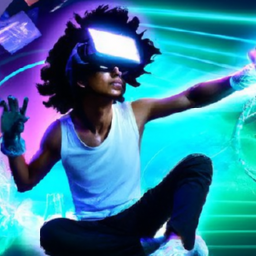The Future of Virtual Reality in Digital Marketing: Discuss the potential impact and benefits of VR in digital marketing
Virtual Reality (VR) has come a long way since its inception. From being a niche technology used primarily for gaming and entertainment purposes, it is now making waves in various industries and is poised to revolutionize the world of digital marketing. In this blog post, we’ll take a closer look at the potential impact and benefits that VR can bring to digital marketing.
What is Virtual Reality?
Virtual Reality is an artificial, computer-generated simulation of a three-dimensional environment that can be interacted with through special electronic devices, such as VR headsets or gloves. The goal of VR is to immerse the user into a virtual world that feels real, creating a sense of presence and depth.
The Potential Impact of VR in Digital Marketing
Virtual Reality has the potential to make a significant impact on the digital marketing landscape by enhancing customer engagement and providing unique and memorable experiences. Here are some potential applications of VR in digital marketing:
Virtual Showrooms
Imagine being able to browse products and walk through virtual showrooms from the comfort of your own home. VR can create immersive experiences that simulate the feeling of physically being in a showroom, allowing customers to interact with products virtually before making a purchase. This can not only enhance the shopping experience but also facilitate informed purchasing decisions.
Virtual Trials and Demos
With VR, customers can try products before buying them. For example, in the cosmetics industry, users can virtually apply makeup to see how it looks on them. The automotive industry can offer virtual test drives, letting customers experience the thrill of driving a car without leaving their homes. These virtual trials and demos can increase customer confidence, drive conversions, and reduce the need for physical experiences.
Virtual Events and Experiences
Virtual reality can enable brands to create immersive events and experiences for their customers. Whether it’s attending a virtual concert, exploring famous landmarks, or participating in virtual conferences, VR can provide a sense of presence and excitement. Brands can leverage VR to connect with their audience in new and exciting ways, enhancing brand loyalty and engagement.
The Benefits of VR in Digital Marketing
The integration of VR in digital marketing offers numerous benefits for both brands and customers. Here are some key advantages that VR brings to the table:
Enhanced Customer Engagement
VR immerses customers into a whole new world, captivating their senses and creating an emotional connection. This level of engagement can result in longer interaction times and increased brand recall. By offering unique and immersive experiences, brands can create a lasting impact on their audience.
Improved Personalization
Virtual Reality can gather valuable insights about customer preferences and behavior. By tracking their interactions within virtual environments, brands can better understand their audience and tailor their marketing strategies accordingly. This level of personalization can help deliver more targeted and relevant content, driving higher conversion rates.
Increased Trust and Transparency
VR can help combat the perception of fake or misleading marketing by providing customers with firsthand experiences. Brands that utilize VR for product trials and virtual showrooms can increase trust and transparency, as customers can see and experience the product for themselves. This can minimize returns and increase customer satisfaction.
Conclusion
The future of virtual reality in digital marketing is promising. VR has the potential to revolutionize the way brands engage with their audience by creating immersive and memorable experiences. From virtual showrooms to virtual events, VR offers a multitude of opportunities to drive customer engagement and enhance brand loyalty. As the technology continues to evolve and become more accessible, it’s time for brands to embrace the power of VR and explore the endless possibilities it holds for digital marketing.











